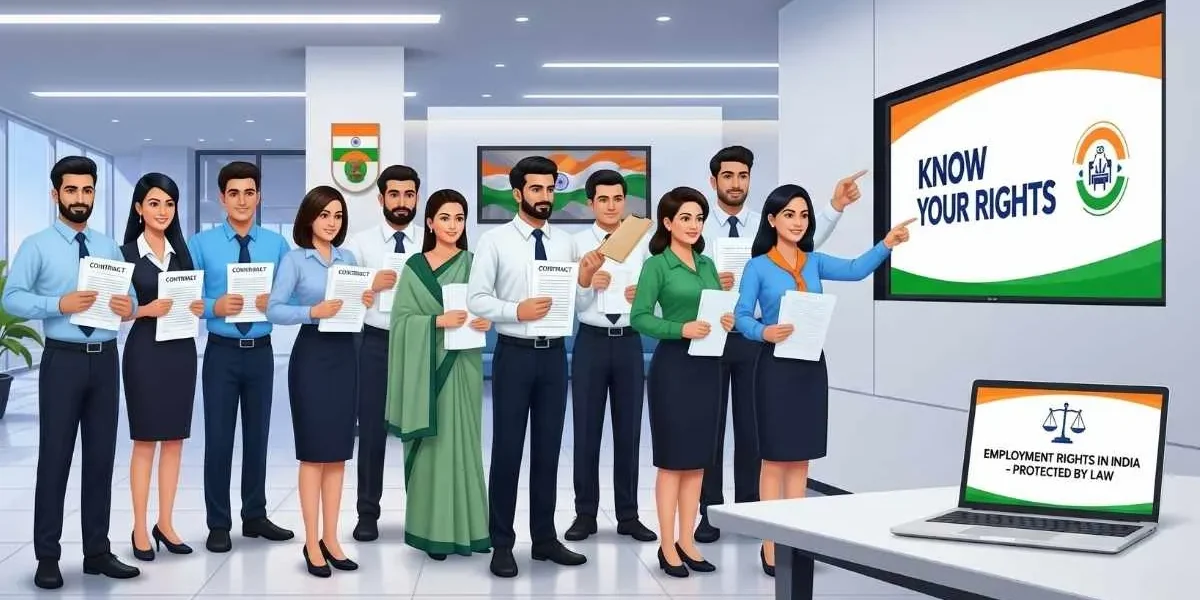
Understanding your employment rights in India ensures you receive fair compensation, work in safe conditions, and have legal recourse against unjust practices. This guide outlines key statutory protections, practical steps for enforcement, and when to consult an employment lawyer in India.
1. Employment Rights in India
Employment rights in India derive from the Constitution and labor statutes designed to protect workers’ wages, hours, safety, and job security. By knowing these rights, employees can identify violations, assert entitlements, and maintain workplace dignity.
2. Fair Wages and Timely Payment
The Minimum Wages Act, 1948 fixes wage floors by skill category. Unskilled workers must receive at least ₹783 per day, semi-skilled ₹863, skilled ₹948 and highly skilled ₹1,035. States may set higher rates but never below central minima. Unauthorized deductions are prohibited.
Under the Payment of Wages Act, 1936, companies with fewer than 1,000 employees must disburse wages within seven days of the wage period and larger establishments have ten days. Only deductions for statutory obligations, income tax, provident fund contributions and small fines are allowed. If you discover underpayment or delays, document pay slips and file a claim with the labor commissioner or appropriate court.
3. Reasonable Working Hours and Overtime
The Factories Act, 1948 caps work at nine hours daily and forty-eight hours weekly. After five hours of continuous work, you must receive a thirty-minute rest break. Section 52 mandates one full rest day per week, working that day requires either a substitute off day or double wages.
Overtime beyond statutory hours commands double-rate pay under Sections 59 and 65. Employers may seek limited exemptions to exceed quarterly overtime caps, but only with formal government approval. Maintain accurate attendance records and challenge any excessive hours through factory or labor inspectors.
4. Paid Leave and Holidays
Rest and recuperation preserve workforce productivity. Section 79 of the Factories Act grants one day of paid earned leave for every twenty days worked, eighteen days annually after one year of service. Casual leave entitles you to eight paid days for emergencies. Government-declared holidays like Republic Day, Independence Day, Gandhi Jayanti and five state-designated festival days are paid. Employees under the Employees’ State Insurance scheme may access up to ninety days of paid medical leave during illness.
5. Maternity Protection and Gender Equality
The Maternity Benefit Act, 1961 provides twenty-six weeks of paid maternity leave up to eight weeks may be taken before delivery, with the balance postnatal. Section 12 prohibits dismissal or service of termination notice during pregnancy or maternity leave. Any breach is illegal and reversible by labor courts. Section 27 confirms these provisions override conflicting contractual terms.
The Equal Remuneration Act, 1976 mandates identical wages for men and women performing the same or similar work. Section 5 bans gender discrimination in recruitment, training, transfer, promotion, and dismissal. Employers must maintain compliance registers, violations attract fines and possible imprisonment for repeat offenses.
6. Protection Against Unlawful Termination
The Industrial Disputes Act, 1947 sets rigorous safeguards for terminating a workman with at least one year of continuous service. Section 25F requires a written notice of one month or pay in lieu, plus retrenchment compensation equal to fifteen days’ average wages per completed year. Section 25G enforces the “last-come, first-go” principle in layoffs. Establishments with one hundred or more employees need prior government permission under Section 25N for any retrenchment. Bypassing these steps renders termination void, labor courts can order reinstatement with back wages and additional compensation.
7. Social Security and Retirement Benefits
The Employees’ Provident Funds and Miscellaneous Provisions Act, 1952 mandates monthly contributions from employer and employee each at 12% of basic wages plus dearness allowance. Section 6C levies an additional 0.5% on employers for deposit-linked insurance. Section 7Q imposes interest penalties on delayed contributions, ensuring timely compliance. Portability provisions allow seamless transfer of accumulated balances across jobs, preserving your retirement corpus.
8. When to Consult an Employment Lawyer India
Complex disputes or persistent violations warrant professional intervention. An employment lawyer in India can:
-
Review contracts and identify statutory breaches
-
Draft and serve legal notices demanding employer compliance
-
Represent you in labor courts or tribunals
-
Negotiate settlements to avoid protracted litigation
Consultation fees vary: online advice may cost ₹13–31 per minute, in-person sessions ₹1,000–30,000, and full case handling ₹100,000–200,000 plus per-hearing fees. Early legal advice clarifies your options, preserves tight deadlines, and strengthens your claim.
9. How to Enforce Your Rights
Effective enforcement relies on meticulous documentation and prompt action:
-
Retain contracts, pay slips, attendance logs, leave applications, and any dismissal notices.
-
Communicate disputes in writing (email or registered post) to build a clear record.
-
Approach your employer’s HR or the Labor Commissioner for initial conciliation.
-
If unresolved, file claims in the appropriate forum: labor courts for dismissal disputes, provident fund commissioners for PF issues, or ESI authorities for medical benefits.
-
Remember statutory time limits: wrongful termination and wage claims generally expire three years from the incident date.
10. Conclusion and Call to Action
Employment rights in India offer robust safeguards for fair wages, reasonable hours, maternity protection, job security, and social security. Awareness and proactive assertion of these rights transform them from abstract laws into tangible protections. Gather your documentation, note key deadlines, and consult an employment lawyer India when necessary. Your informed action is the most powerful tool against workplace injustice.
Leave a Comment